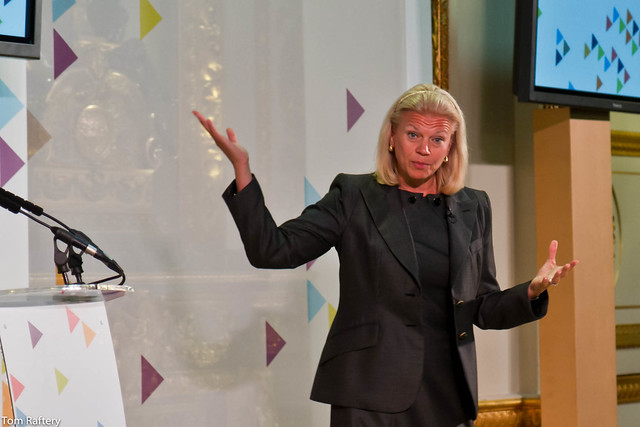
I’ve always admired IBM’s achievements in the diversity and equality arena.
Some of their milestones down through the years include:
- In 1914, 76 years before the US Disabilities Act, IBM hired its first disabled employee.
- In 1942 IBM launched a disabled employee training program.
- In 1943 Ruth Leach Amonette was elected IBM?s first female Vice President.
- In 1946 IBM hired T.J. Laster, their first black sales representative, 18 years before the Civil Rights Act of 1964.
- In 1953 IBM chairman Thomas Watson issued the company?s first Equal Opportunity Policy letter.
- And in 2011, IBM announced that Ginni Rometty would take over as President and CEO – the first female CEO in the history of the company.
Consequently, I was stunned to read at the weekend that IBM’s CEO was snubbed by the organisers of the US Open at Augusta simply because she is a woman, and despite this IBM continued to sponsor the event!
A bit of background – the Augusta National Golf Club is a private club, so it can set its own rules. Its rules have been notoriously discriminatory through the years – it didn’t admit black members until 1990, until recently it had a policy requiring all caddies to be black, and it continues to refuse women membership.
The fact that it refuses to allow female membership is now sharply in focus because the club has traditionally invited the CEO’s of the main sponsors of the US Masters to become members. By the end of this year’s tournament, despite IBM’s significant sponsorship, Ms Rometty had not been invited to become a member, because of her gender.
Now Ms Rometty is reportedly not a frequent golfer, so while it may not be a devastating blow to her game, it is a slap in the face that she wasn’t asked to be a member when her predecessors at IBM were. As were the CEO’s of the two other Masters sponsors (AT&T and Exxon Mobil).
IBM’s involvement with the event goes back many years and they are tied into it deeply not just financially but also at a technological level. According to Bloomberg
IBM is featured in the tournament?s TV commercials and runs its website, mobile-phone applications and media-center technology. Palmisano serves on Augusta?s technology tournament committee. He remains IBM?s chairman — a role Rometty is likely also to assume upon his retirement
Augusta may need IBM more than IBM needs the Masters.
Despite that, IBM went ahead with its sponsorship of the event and made no statement about the bigoted position of the club or its treatment of their CEO (and any other woman who may wish to become a member).
It would be outrageous if IBM were to continue to sponsor an organisation which practices such blatant discrimination. If the club’s rules banned people based on their religion, or their sexual preference, or as they did until recently, their race, would IBM sponsor them? Of course not. This is no different.
Some will argue that IBM gets great publicity from the Masters. Publicity which it would be loath to lose. I doubt that is the case for two reasons – 1. IBM would likely get tremendous press if it very publicly withdrew its sponsorship from the event on the grounds of the club’s prejudicial rules and 2. I’d like to think IBM is not the type of company that sells its ethics and reputation just for a couple days in the limelight.
If nothing is done to correct this, the fact that IBM is financially (and technically) backing such a sexist organisation, threatens to do serious damage to the good name IBM has built-up as a corporate citizen over the years. And that’s not at all to touch on the message this sends to IBM’s female employees – what must they be thinking about IBM’s attitude to women now?
For example, I can’t help wondering how this squares up with IBM’s Workforce Diversity Policy states [my emphasis added]:
Business activities such as hiring, training, compensation, promotions, transfers, terminations and IBM-sponsored social and recreational activities are conducted without discrimination based on race, color, genetics, religion, gender, gender identity or expression, sexual orientation, national origin, disability, age or status as a special disabled veteran or other veteran covered by the Vietnam Era Veterans Readjustment Act of 1974, as amended.
These business activities and the design and administration of IBM benefit plans comply with all applicable federal, state and local laws, including those dealing with equal opportunity. IBM also makes accommodation for religious observances, which IBM determines reasonable.
In respecting and valuing the diversity among our employees and all those with whom we do business, managers are expected to ensure that there is a work environment free of all forms of discrimination and harassment.
We can only hope that work is going on behind the scenes to fix this. It will be interesting to see what the position will be for the 2013 Masters Tournament – will IBM still be a sponsor? will Ginni Rometty be admitted as a member as an exception to the all-male rule on the basis of IBM’s sponsorship? or will the club finally change its misogynistic rules?
If next year the club still refuses to have women members, and IBM continues to sponsor the Masters, it will see IBM become the unlikely new champion of discrimination against women.
Photo Credits Tom Raftery and sashafatcat
Follow @TomRaftery


Maybe I am being naive, but what concerns me is the expectation of membership in exchange for sponsorship in the first place – in other words, a personal kickback in exchange for corporate funds. This would be against the procurement rules of most companies.
Very good point Darren.
And, this could easily be used as an out for IBM – they could claim that Ginni had refused a membership offer for those very reasons.
It still wouldn’t take from IBM’s helping support a discriminatory organisation though.
Well I think the story goes that it’s an established “tradition” that the club offers membership, rather than it being a straight exchange for sponsorship, but maybe that was how the tradition started.
I agree with Tom’s discussion here though – it’s sad that an organisation that pioneered so much in terms of equality is now in this situation – and the negative stories will come up on an annual basis while Rometty is in the role, I’m afraid.